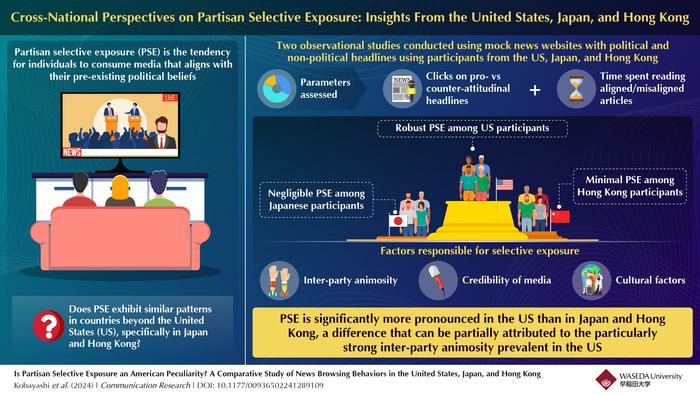Summary: A new study reveals that Americans are significantly more likely to seek out news that confirms their political beliefs compared to readers in Japan and Hong Kong. The research challenges the assumption that political echo chambers are a natural human behavior, suggesting instead that cultural and political environments play a crucial role in how people consume news.
Journal: Communication Research, October 10, 2024, DOI: 10.1177/00936502241289109 | Reading time: 4 minutes
Breaking Out of the American Bubble
While many assume that seeking out news that confirms our existing beliefs is just human nature, new research suggests this behavior might be more cultural than psychological. The study, which compared news reading habits across three countries, reveals that this tendency – known as partisan selective exposure – is far more pronounced in the United States than in Asian countries.
“Since political communication research is predominantly US-centric, there is a tendency to apply American findings directly to the Asian context,” explains Professor Tetsuro Kobayashi from Waseda University. “Our study challenges such a tendency and demonstrates the importance of conducting research that is specifically tailored to the Asian context.”
Testing News Choices
To understand how people in different countries approach news, researchers created mock news websites for participants in the United States, Japan, and Hong Kong. These sites presented both political and non-political headlines, allowing readers to choose stories that either aligned with or challenged their political beliefs.
The results were clear: Americans showed a strong preference for news that supported their existing views, while readers in Japan and Hong Kong were more likely to explore diverse perspectives.
Cultural Differences Matter
“In the US, this selective exposure is fueled by several factors,” Kobayashi notes. “The country has a highly polarized and emotionally divided political environment, and many news outlets have clear political leanings.”
The situation differs markedly in Japan, where political polarization is less intense and news outlets generally maintain more neutral stances. This environment appears to foster a more balanced flow of information between opposing groups.
Implications for Democracy
“Our research challenges the assumption that selective exposure is just a natural human tendency driven by psychology,” Kobayashi adds. “Beyond the desire to avoid cognitive dissonance, our results suggest that the media and political environment of a country play a critical role in shaping how individuals engage with news.”
Glossary
- Partisan selective exposure: The tendency to seek out information that confirms existing political beliefs
- Echo chambers: Environments where people are exposed only to opinions that match their own
- Cognitive dissonance: Mental discomfort from encountering information that conflicts with existing beliefs
- Political polarization: The division of people into opposing political groups
Quiz
- In which country was partisan selective exposure most pronounced?
Answer: United States - What type of news environment does Japan have compared to the US?
Answer: Less polarized with more neutral news outlets - How did researchers test news consumption habits?
Answer: Using mock news websites with political and non-political headlines - What did the study challenge about selective exposure?
Answer: The assumption that it is just a natural human tendency driven by psychology
Enjoy this story? Get our newsletter! https://scienceblog.substack.com/
If our reporting has informed or inspired you, please consider making a donation. Every contribution, no matter the size, empowers us to continue delivering accurate, engaging, and trustworthy science and medical news. Independent journalism requires time, effort, and resources—your support ensures we can keep uncovering the stories that matter most to you.
Join us in making knowledge accessible and impactful. Thank you for standing with us!

